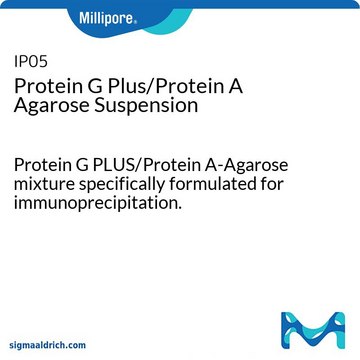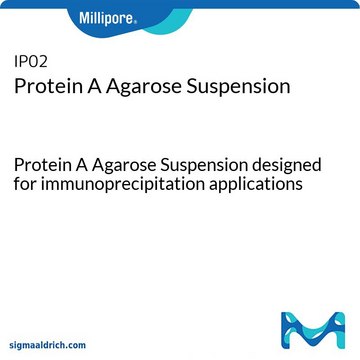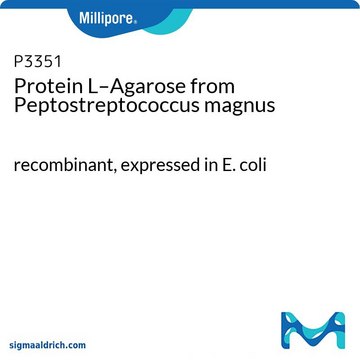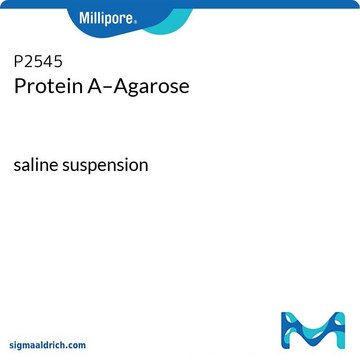IP04
Protein G Plus-Agarose Suspension
Protein G PLUS agarose suspension specifically formulated for immunoprecipitation.
Sign Into View Organizational & Contract Pricing
All Photos(1)
About This Item
UNSPSC Code:
41116133
NACRES:
NA.56
Recommended Products
form
slurry (Liquid)
contains
≤0.1% sodium azide as preservative
manufacturer/tradename
Calbiochem®
storage condition
do not freeze
technique(s)
immunoprecipitation (IP): suitable
suitability
suitable for immunoprecipitation
shipped in
wet ice
storage temp.
2-8°C
General description
Designed for immunoprecipitation applications. This product is blocked with BSA to reduce non-specific binding and cannot be used for purification; best for bovine, goat, human, and rat IgG and for mouse IgG1.
Protein G PLUS agarose suspension specifically formulated for immunoprecipitation.
Warning
Toxicity: Standard Handling (A)
Other Notes
Agarose solution is supplied ready to use. Protein G Plus agrarose is blocked with BSA and should not be used for immunoglobulin purification or covalent cross-linking. For immunoprecipitation reactions 15 µl/µg primary antibody is recommended. Preclearing will minimize extra bands resulting from nonspecific precipitation. To preclear, add to the sample 20 µl agarose conjugate and 1 µg normal IgG from the same species as the immunoprecipitating antibody. When immunoblotting is used for detection, some secondary antibodies can react nonspecifically with BSA or other proteins present at high concentrations in the sample. This can be eliminated by reducing the concentration of secondary antibody.
Legal Information
CALBIOCHEM is a registered trademark of Merck KGaA, Darmstadt, Germany
Storage Class Code
11 - Combustible Solids
WGK
WGK 1
Flash Point(F)
Not applicable
Flash Point(C)
Not applicable
Certificates of Analysis (COA)
Search for Certificates of Analysis (COA) by entering the products Lot/Batch Number. Lot and Batch Numbers can be found on a product’s label following the words ‘Lot’ or ‘Batch’.
Already Own This Product?
Find documentation for the products that you have recently purchased in the Document Library.
Customers Also Viewed
Leo K Iwai et al.
Journal of proteome research, 9(6), 3135-3145 (2010-05-05)
Type 1 diabetes, in human patients and NOD mice, results from an immune attack on insulin-producing beta-cells of the pancreas by autoreactive T lymphocytes. In NOD mice, genetically controlled perturbations in the signaling pathways downstream of the antigen-specific T cell
Hayeong Kwon et al.
Journal of cellular and molecular medicine, 13(8A), 1549-1564 (2009-09-26)
Mitogenic regulation by caveolin-2 in response to insulin was investigated. Insulin triggered phosphorylation of caveolin-2 on tyrosine 19. Insulin increased the interaction between pY19-caveolin-2 and phospho-ERK, and that interaction was inhibited by a MEK inhibitor U0126. Insulin-induced interaction of caveolin-2
Kensuke Sakamoto et al.
Molecular biology of the cell, 21(16), 2966-2974 (2010-06-25)
CREB (cyclic AMP response element-binding protein) is a stimulus-induced transcription factor that plays pivotal roles in cell survival and proliferation. The transactivation function of CREB is primarily regulated through Ser-133 phosphorylation by cAMP-dependent protein kinase A (PKA) and related kinases.
Siqi Li et al.
The Journal of pathology, 254(3), 265-278 (2021-04-03)
Chemoresistance is a major obstacle to the treatment of triple-negative breast cancer (TNBC), which has a poor prognosis. Increasing evidence has demonstrated the essential role of cancer stem cells (CSCs) in the process of TNBC chemoresistance. However, the underlying mechanism
Roshia Ali et al.
Frontiers in oncology, 12, 841303-841303 (2022-03-12)
SNTA1 signaling axis plays an essential role in cytoskeletal organization and is also implicated in breast cancers. In this study, we aimed to investigate the involvement of actin cytoskeleton in the propagation of SNTA1/p66shc mediated pro-metastatic cascade in breast cancer
Our team of scientists has experience in all areas of research including Life Science, Material Science, Chemical Synthesis, Chromatography, Analytical and many others.
Contact Technical Service











